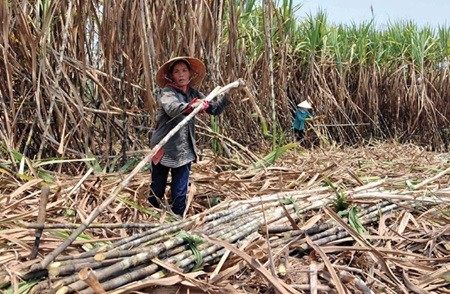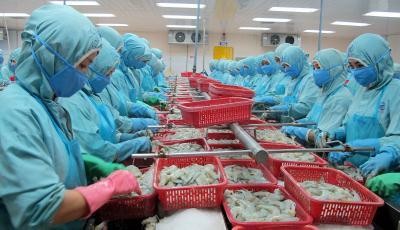(VOVworld) – Last Monday, Vietnam and 11 other countries completed TPP negotiations. Making full use of the deal’s opportunities and anticipating and minimizing accompanying risks will be keys for Vietnam’s economy to thrive and its businesses to catch up with global development.

Dai An Commune's farmers harvest sugarcane in southern Soc Trang Province.
(Photo: An Hieu/ VNA/VNS) |
Vietnam is said to be one of the countries that will benefit most from the Trans-Pacific Partnership agreement. It’s estimated that the TPP will help Vietnam’s GDP to increase an additional 23.5 billion USD by 2020 and 33.5 billion USD by 2025 while its exports will increase 68 billion USD by 2025.
Major markets like the US, Japan, and Canada slashing import duties to 0% will create a boost for Vietnam’s exports. Vietnam’s main export industries – garments, textiles, footwear, farm produce, and aquatic products will likely see gigantic breakthroughs in exports to these countries.
 |
| Processing frozen shrimp in Soc Trang province. (Photo: Trung Hieu/VNA) |
According to economist Nguyen Tri Hieu, Vietnam will have new opportunities once it joins the TPP but, at the same time, will face through challenges.
He said “the TPP will offer Vietnam a great opportunity to integrate into the global economy. But the integration will likely change the Vietnamese economy completely, most notably where Vietnam has significant export revenues – garments, textiles, agricultural produce, and aquatic products.”
The US and Japan buy 40% of the Vietnamese goods currently sold to TPP members.
 |
| Making leather products at LADODA Company. (Photo: Tran Viet) |
During TPP negotiations, Vietnam’s garment and textile sector appeared to be the biggest winner. But Vietnamese garment and textile companies will have to satisfy the TPP rules of origin for textiles and apparel known as “Yarn-Forward”, which require a TPP nation to use TPP-produced yarn in textiles in order to receive duty-free access.
Ngo Duc Hoa, President of the Thang Loi Garment Joint Stock Company, said this is something Vietnam should attend to immediately.
Hoa noted that “the biggest problem for Vietnamese enterprises will be the goods’ origins. Currently domestic exporters don’t meet the requirements of the TPP rules of origin. If they must import materials from the US or Japan, product costs will be very high.”
To gain maximum benefit from the TPP, Vietnam’s garments and textiles sector has put forward plans to grasp the opportunity and maintain its current growth rate.
The Vietnam National Textile and Garment Group has worked with ministries, other sectors, provinces, and companies to set up zones specialized in material cultivation and boost product design and production to sell directly to end-users.
Vietnam is one of the 15 biggest exporters of farm produce to the US. Japan, also a TPP member, is the third biggest importer of Vietnamese agricultural produce, mainly coffee and vegetables.
Domestic sugar firms will face adverse effects from the agreement because Vietnam must open its market and remove import quotas. The industry will see increased competition from other TPP members like Australia, the world’s third largest sugarcane producer. Vietnam’s milk industry will be similarly challenged by Australia and New Zealand.